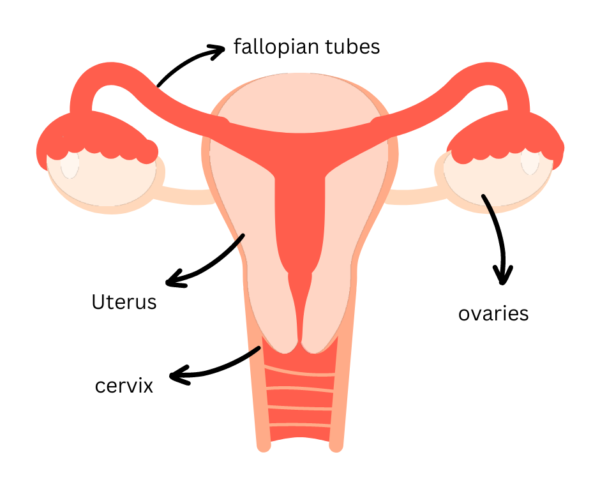What is Infertility
Infertility is the inability to conceive (achieve pregnancy) despite having regular unprotected sexual intercourse for one or more than one year (six months for women over 35yrs)between a male & a female partner.

Infertility affects one in six couples worldwide; more than 186 million individuals of reproductive age worldwide significantly impact their families and communities.
Understanding Conception
Getting pregnant or conceiving is a complicated process with many steps involved.

Ovulation is when a woman’s ovary releases an egg around day 14 of a 28-day menstrual cycle, although the exact timing can vary. The egg then travels through the fallopian tube, where it may be fertilized by sperm. Conception happens when a sperm fertilizes an egg, forming a zygote, which then implants in the lining of the woman’s uterus, where it begins to grow into a fetus.
Psychological effects of Infertility
Infertility can have profound psychological effects.
Parenthood is one of the significant evolutions in adult life for both men and women.
The stress of the inability to conceive can have profound emotional effects, such as anger, depression, anxiety, marital problems, and feelings of worthlessness.
Females trying to conceive often have depression rates similar to those with heart disease or cancer.
Infertile couples may experience societal and family pressure, which can lead to social seclusion.
Does Women’s age matter in fertility?
One of the most critical factors in evaluating a couple with fertility problems is the woman’s age.
As a woman gets older, there are lower chances of conception.
In women aged 15 to 34, infertility rates are 7.3 to 9.1%.
In women ages 35 to 39, the infertility rate is up to 25%.
Women between the ages of 40 to 44 years have a 30% chance of Infertility.
The reduction in female fertility starts at 30 years and becomes more prominent at 40.
After 40yrs of age, there is a low possibility of success and an increased risk of developing maternal pregnancy ailments such as pre-eclampsia, hypertension, and diabetes, as well as fetal chromosomal abnormalities and miscarriages.
Reasons behind Infertility
Approximately 80-85% of infertile couples have an identifiable cause & 10-15% don’t have an identifiable cause.
Male Infertility account for 20-30% of Infertility cases.
Female Infertility account for 20-35% of Infertility cases.
Combined, Male & Female Infertility accounts for 25-40% of Infertility cases.
Idiopathic or Unexplained Infertility: In about 10-20% of Infertility cases, No cause is found.

Let’s elaborate on these factors:
Male Infertility:
Several types of male Infertility can make it difficult for a man to father a child. Some of the most common causes include:
- Sperm production or function issues: Disorders such as varicocele (swelling of the veins in the testicles), genetic defects, or infection can affect the quantity and quality of sperm, making it complicated for fertilization.
- Ejaculation disorders: Disorders such as retrograde ejaculation (when semen is ejaculated into the bladder instead of out of the penis) or ejaculatory duct obstruction can make it difficult for sperm to be ejaculated during intercourse.
- Hormonal imbalances: Abnormal levels of hormones such as testosterone can affect sperm production and function.
- Environmental factors: Exposure to certain toxins and chemicals, radiation, and other environmental factors can affect sperm production and function.
- Lifestyle factors: smoking, alcohol consumption, drug use, and other factors can affect sperm production and function.
- Genetic disorders: some genetic disorders, such as Klinefelter syndrome, can affect the testicles and lead to Infertility.
Female Infertility
Several types of female Infertility can make it difficult for a woman to conceive. Some of the most common causes include:
- Ovulatory disorders: Conditions that affect ovulation, such as polycystic ovary syndrome (PCOS) or premature ovarian failure (POF), can make it difficult for a woman to become pregnant.
- Fallopian tube blockages: The tubes carry the egg from the ovaries to the uterus. Blockages in these tubes, caused by causes like pelvic inflammatory disease (PID) or endometriosis, can prevent fertilization.
- Uterine or cervical issues: Conditions such as fibroids or abnormal cervical mucus can make it difficult for the fertilized egg to implant in the uterus or for sperm to reach the egg.
- Endometriosis is a condition that occurs when the tissue that lines the uterus grows outside of it. It can cause inflammation, scarring, and distortion of pelvic anatomy.
- Age-related factors: As a woman ages, her fertility declines, and it becomes more difficult for her to conceive.
For both women and men, environmental and lifestyle aspects such as smoking, excessive alcohol intake, obesity, and exposure to environmental pollutants have been linked with lower fertility rates.
Primary Vs. Secondary Infertility
Primary Infertility – Primary Infertility is Infertility in a couple who has never had a child.
It is the inability to conceive a child or carry a pregnancy to term after one year of regular, unprotected intercourse. It means that a couple has not been able to achieve a pregnancy in the past, regardless of the number of pregnancies they may have had.
Secondary Infertility, on the other hand, refers to the inability to conceive a child or carry a pregnancy to term after a woman has previously given birth or had a successful pregnancy.
Does Diet play a role in Infertility?

Diet can play a role in Infertility, as certain nutrient deficiencies or excesses can affect reproductive health. For example, being overweight or underweight can disrupt hormone levels and affect ovulation in women. Consuming a diet high in processed foods and added sugars can also lead to weight gain and affect hormone levels.
A lack of certain nutrients, such as iron, folic acid, and vitamin D, can also affect reproductive health. Deficiencies in these nutrients can cause problems with ovulation, implantation, and fetal development. Additionally, a lack of essential fatty acids (EFAs) in the Diet can affect the quality of cervical mucus and negatively impact the ability of sperm to fertilize an egg.
On the other hand, eating a balanced diet rich in fruits, vegetables, whole grains, lean proteins, and healthy fats can provide the necessary nutrients for optimal reproductive health.
It is also important to note that eating a healthy diet is not a guarantee for fertility, but it does help provide all the necessary nutrition to make you more fertile.
What Supplements are essential if you are trying to conceive?

Several supplements can benefit your reproductive health if you are trying to conceive. These include:
- Folic acid: Folic acid is essential for fetal development and can help prevent birth defects. It’s recommended that women trying to conceive take a folic acid supplement of at least 400 micrograms daily.
- Iron: Iron is essential for developing the placenta and fetal blood cells. Women trying to conceive should aim for at least 18 milligrams of iron daily.
- Vitamin D: Vitamin D is essential for overall health and helps the body absorb calcium, which is vital for developing a healthy fetus. It’s recommended that women trying to conceive should take a vitamin D supplement of at least 600-800 international units daily.
- Omega-3 fatty acids: Omega-3 fatty acids are essential for developing the nervous system and can help improve the quality of cervical mucus.
- Antioxidants: Antioxidants such as Vitamin C, E, and Coenzyme Q10 are important for sperm health and can help protect against damage caused by free radicals.
It’s important to note that every person’s needs and the situation is unique, and it’s essential to consult your doctor or a specialist for personalized advice on supplement use, as some might not be recommended for specific conditions or medications. Also, certain supplements may interact with medicine or other underlying disease and should be discussed with your doctor before starting.
How can homeopathy help with Infertility?

Homeopathy is a form of holistic medicine that uses highly diluted, potentized natural substances to stimulate the body’s healing processes. Some people believe that homeopathy can help with Infertility by addressing underlying health issues and restoring balance to the body.
Homeopathic remedies are chosen based on the individual’s symptoms, physical and emotional characteristics, and overall medical history.
The practitioner may also consider external factors such as stress, environment, and lifestyle.
Some homeopathic remedies commonly used for Infertility include Sepia, Pulsatilla, Natrum Mur & Calcarea carb.
Many people choose homeopathy as a form of treatment for Infertility because it is gentler and less invasive than conventional medical interventions such as hormone therapy or surgery.
Homeopathy addresses underlying health issues rather than just treating symptoms and is based on the principle of “like cures like,” where a substance that causes symptoms in a healthy person is used to treat similar symptoms in a sick person.
Additionally, some people choose homeopathy because they believe that, unlike conventional medications, Homeopathy doesn’t have any side effects and can improve overall health and well-being.
If you or anyone you know is dealing with Infertility & would like to know how homeopathy can help them, Book a consultation with me now!
References:
https://pubmed.ncbi.nlm.nih.gov/8142988/
https://www.ncbi.nlm.nih.gov/books/NBK556033/
https://pubmed.ncbi.nlm.nih.gov/12537824/
https://www.ncbi.nlm.nih.gov/pmc/articles/PMC6932903/

